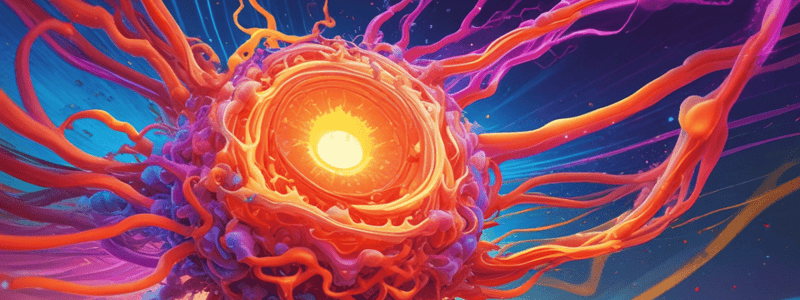Podcast
Questions and Answers
What is the measure of randomness in a system?
What is the measure of randomness in a system?
Entropy
What category of reactions requires an input of energy to proceed and builds complex molecules from simpler components?
What category of reactions requires an input of energy to proceed and builds complex molecules from simpler components?
Endergonic reactions
Define catabolism.
Define catabolism.
The process of breaking down materials within the body
What are the two processes involved in metabolism?
What are the two processes involved in metabolism?
How do age and gender affect the speed of metabolism within the body?
How do age and gender affect the speed of metabolism within the body?
What are the factors that can increase or decrease the speed of metabolism in the body?
What are the factors that can increase or decrease the speed of metabolism in the body?
What is the source of energy that allows organisms to maintain their organization and stay alive?
What is the source of energy that allows organisms to maintain their organization and stay alive?
What type of energy transformation results in heat, which contributes to increasing disorder in the universe?
What type of energy transformation results in heat, which contributes to increasing disorder in the universe?
What is the energy source that powers the process of photosynthesis?
What is the energy source that powers the process of photosynthesis?
Define exergonic reaction.
Define exergonic reaction.
What is the key process involved in cellular respiration?
What is the key process involved in cellular respiration?
What do oxidation-reduction reactions form in organisms?
What do oxidation-reduction reactions form in organisms?
Explain oxidation in the context of Redox reactions.
Explain oxidation in the context of Redox reactions.
What occurs during reduction in Redox reactions?
What occurs during reduction in Redox reactions?
Why do oxidation and reduction reactions occur simultaneously?
Why do oxidation and reduction reactions occur simultaneously?
Explain the relationship between oxidation and reduction reactions.
Explain the relationship between oxidation and reduction reactions.
What is the definition of energy according to physicists?
What is the definition of energy according to physicists?
What are the two forms of energy that make up the total amount of energy in any object?
What are the two forms of energy that make up the total amount of energy in any object?
What is Potential Energy?
What is Potential Energy?
What is Kinetic Energy?
What is Kinetic Energy?
What are Calories used to measure?
What are Calories used to measure?
How much energy does one calorie (cal) represent?
How much energy does one calorie (cal) represent?
What is the most common unit for measuring the energy content of food?
What is the most common unit for measuring the energy content of food?
What do plants transform in photosynthesis into potential energy stored in the chemical bonds of sugars?
What do plants transform in photosynthesis into potential energy stored in the chemical bonds of sugars?
What is the function of ATP in organisms?
What is the function of ATP in organisms?
Why do organisms not stockpile large amounts of ATP?
Why do organisms not stockpile large amounts of ATP?
What is the purpose of enzymes in biochemical reactions?
What is the purpose of enzymes in biochemical reactions?
What is the role of the Active Site in enzymes?
What is the role of the Active Site in enzymes?
How do enzymes speed up reactions?
How do enzymes speed up reactions?
Which organelles are specialized sacs of enzymes?
Which organelles are specialized sacs of enzymes?
What is the key to the specificity of enzymes?
What is the key to the specificity of enzymes?
What do cells do when ATP supplies run low?
What do cells do when ATP supplies run low?
What is the lock-and-key model used to describe in enzyme-substrate interactions?
What is the lock-and-key model used to describe in enzyme-substrate interactions?
What happens to the active site of an enzyme after it releases the products?
What happens to the active site of an enzyme after it releases the products?
Describe the enzyme-substrate complex (ES).
Describe the enzyme-substrate complex (ES).
What conditions can affect enzyme activity?
What conditions can affect enzyme activity?
What is the optimal pH range for most enzymes?
What is the optimal pH range for most enzymes?
Give an example of an enzyme with an optimal pH in the stomach.
Give an example of an enzyme with an optimal pH in the stomach.
What can happen to enzymes at very high temperatures?
What can happen to enzymes at very high temperatures?
What are Cofactors in enzyme function?
What are Cofactors in enzyme function?
Flashcards
What is Entropy?
What is Entropy?
Measure of randomness or disorder in a system.
What are Endergonic Reactions?
What are Endergonic Reactions?
Reactions requiring energy input to build complex molecules.
What is Catabolism?
What is Catabolism?
The breakdown of complex molecules into simpler ones.
What are the two main processes in metabolism?
What are the two main processes in metabolism?
Signup and view all the flashcards
What powers living organisms?
What powers living organisms?
Signup and view all the flashcards
What is an Exergonic Reaction?
What is an Exergonic Reaction?
Signup and view all the flashcards
What is Cellular Respiration?
What is Cellular Respiration?
Signup and view all the flashcards
What do Redox reactions for in organisms?
What do Redox reactions for in organisms?
Signup and view all the flashcards
What is Oxidation?
What is Oxidation?
Signup and view all the flashcards
What is Reduction?
What is Reduction?
Signup and view all the flashcards
Why Oxidation & Reduction occur together?
Why Oxidation & Reduction occur together?
Signup and view all the flashcards
What is Energy?
What is Energy?
Signup and view all the flashcards
What are the two forms of energy?
What are the two forms of energy?
Signup and view all the flashcards
What is Potential Energy?
What is Potential Energy?
Signup and view all the flashcards
What is Kinetic Energy?
What is Kinetic Energy?
Signup and view all the flashcards
What is a calorie (cal)?
What is a calorie (cal)?
Signup and view all the flashcards
Common unit for food energy?
Common unit for food energy?
Signup and view all the flashcards
Photosynthesis transforms what energy?
Photosynthesis transforms what energy?
Signup and view all the flashcards
What is the function of ATP?
What is the function of ATP?
Signup and view all the flashcards
Why not stockpile ATP?
Why not stockpile ATP?
Signup and view all the flashcards
What is the purpose of enzymes?
What is the purpose of enzymes?
Signup and view all the flashcards
What is the Active Site?
What is the Active Site?
Signup and view all the flashcards
How do enzymes speed reactions?
How do enzymes speed reactions?
Signup and view all the flashcards
What determines enzyme specificity?
What determines enzyme specificity?
Signup and view all the flashcards
What cells do when ATP is low?
What cells do when ATP is low?
Signup and view all the flashcards
What is the lock-and-key model?
What is the lock-and-key model?
Signup and view all the flashcards
What happens after releasing products?
What happens after releasing products?
Signup and view all the flashcards
What is the enzyme-substrate complex (ES)?
What is the enzyme-substrate complex (ES)?
Signup and view all the flashcards
What conditions affect enzymes?
What conditions affect enzymes?
Signup and view all the flashcards
What are Cofactors?
What are Cofactors?
Signup and view all the flashcards




